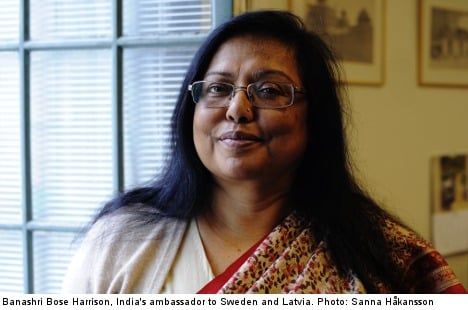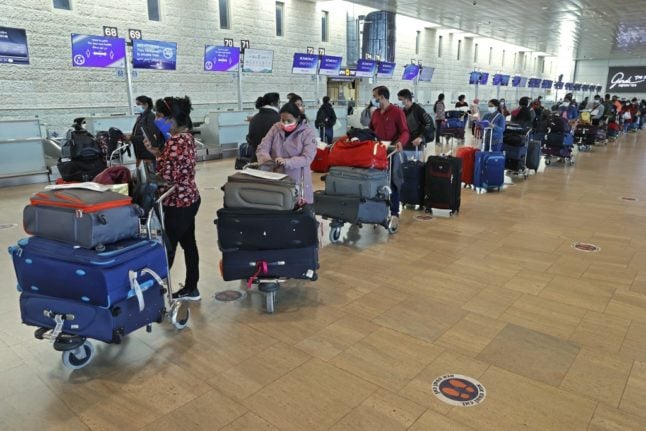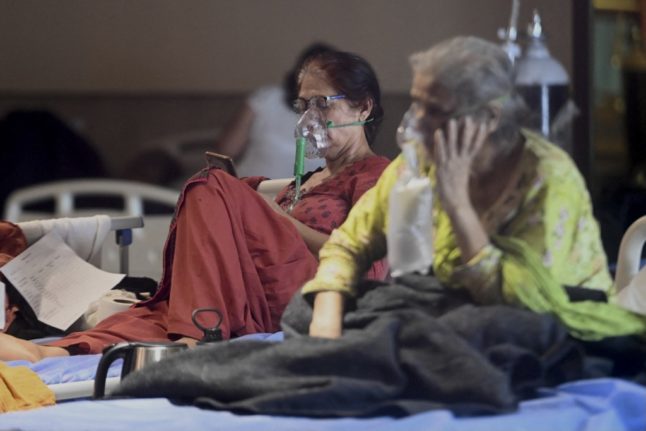She may be tucked into one of the northernmost reaches of the EU, but Bose Harrison is technically in central Europe. After heading the Central Europe department, which includes Sweden, at the Foreign Office in Delhi for two years, she became envoy in Stockholm, where the long winter demands a discreetly colour-matched cardigan to go with her array of saris.
In the monthly newsletter sent out by the Embassy, the focus is very much on business.
"If we look at India's priority needs, those are the very areas in which Sweden has established strengths," Bose Harrison tells The Local, singling out green technology as the main focus.
"We are very conscious that unless we grow responsibly, there are consequences let alone for the world but for India. I won't take credit for India being very altruistic but will say that we have a shared interest, and we take our responsibilities seriously."
The long list of would-be technology purchases include Swedish waste management and biogas equipment.
"That all the public transport in Linköping is run on biogas shows there are very smart solutions in Sweden," says Bose Harrison, who grew up in Delhi before the introduction of compressed natural gas to the Indian capital. Before the fuel reform, Dilliwallahs faced a wall of pollution every day.
Although Bose Harrison is Bengali, she was raised in Delhi. She taught public finance and microeconomics to graduate and postgraduate students at Delhi University in her alma mater Miranda House for four years before her move into diplomacy in 1981. Her father had made her promise she would take the public service entry exam.
"He passed away before I could negotiate with him, as I really enjoyed my job as a lecturer," says Bose Harrison, who dutifully subjected herself to what she calls the "national jamboree" when the country of 1.3 billion citizens scouts for the next generation of public servants.
"All these professions are what we quite snobbishly call 'class one' but they basically form the administrative nuts and bolts of the country," the ambassador says.
She didn't think she would pass, as competition is legendarily stiff, but did. Her first posting was to Paris, followed by Budapest, Pretoria and Washington, DC. Along the way, she picked up fluent French and a working knowledge of Hungarian.
After her arrival in Sweden last August, Bose Harrison and her staff were soon embroiled in the global outrage over a brutal gang rape in Delhi, which killed a young student.
"We really took the time to respond to all the emails we got after the rape," says Bose Harrison.
"It's difficult because obviously only bad news is good news, but I felt many newspapers only reported on the event, but they didn't focus on how quickly the government responded.
"I am very proud of the fact that Indians went to town and held the government accountable," says Bose Harrison. "The government very quickly set up a Judicial Committee. None of that gets reported."
Among Swedish newspapers, she credits business daily Dagens Industri for its coverage, but underlines that it is limited to the economic aspect.
"Otherwise, India is reported in terms of the old negative stereotypes."
Yet, Bose Harrison thinks increased contacts between Indians and Swedes will increase awareness and understanding. In January, she signed a memorandum of understanding with Uppsala University that aims to set up a chair in Indology.
Painting the full picture of such a vast country is no easy task, but Bose Harrison thinks the mix of old and new underpins the charm of her country.
"So you'll still have the press wallah ironing shirts by the side of the road, but he'll have a mobile phone where he gets text messages from a stressed housewife who wants him to pick up her husband's newly laundered shirts," the ambassador offers an example.
"It is a perfect example of modern technology used for something that is very traditional."
On occasion, Europeans have asked her if an Arab Spring-type movement is on the rise in India.
"It makes me laugh, are they out of their minds? There are no constraints on people voicing their opinions in India," says Bose Harrison.
"Democracy is a very strong plant but it can grow in different types of soil. That's the biggest lesson India can bring to the table."
But it is not the only thing on the table for Sweden, she underlines, putting her faith to business-to-business dealings as much as to good bilateral relations.
"There are good industries in Sweden that will die without demand. Assured demand makes India worthwhile for them."
Ann Törnkvist




 Please whitelist us to continue reading.
Please whitelist us to continue reading.
Member comments